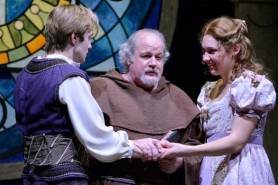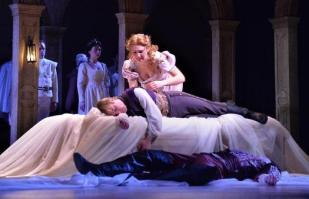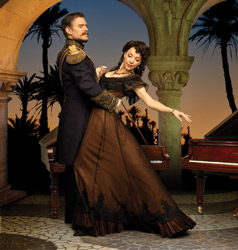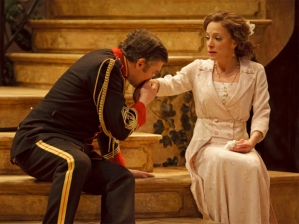 Sunday I was able to visit my very favorite theatre, the Blackfriars in Staunton, Virginia, to see A Midsummer Night’s Dream. I spent a month at the Blackfriars in 2008 as part of NEH grant and fell in love with it then and its underlying theory of exploring original practices (from Shakespeare’s time) in the production of Shakespeare in our time. If I had to briefly sum up what makes Blackfriars special, I’d have to say it’s in the connections they create in each performance with their audiences. No two shows are exactly alike because no two audiences are exactly alike, and though I had only a day in Staunton this visit and could only see the one show, I greatly enjoyed in 2008 watching multiple performances of the same play and studying how the actors interacted with different audiences. There is no better theater to sit and watch audiences as they sit and watch actors.
Sunday I was able to visit my very favorite theatre, the Blackfriars in Staunton, Virginia, to see A Midsummer Night’s Dream. I spent a month at the Blackfriars in 2008 as part of NEH grant and fell in love with it then and its underlying theory of exploring original practices (from Shakespeare’s time) in the production of Shakespeare in our time. If I had to briefly sum up what makes Blackfriars special, I’d have to say it’s in the connections they create in each performance with their audiences. No two shows are exactly alike because no two audiences are exactly alike, and though I had only a day in Staunton this visit and could only see the one show, I greatly enjoyed in 2008 watching multiple performances of the same play and studying how the actors interacted with different audiences. There is no better theater to sit and watch audiences as they sit and watch actors.
Sunday’s performance was the best performance of Dream I’ve ever seen. The friend I went with, an avid theatergoer, said it was the best Shakespeare he’d ever seen performed. It was his first time at the Blackfriars, but it won’t be his last.
The Blackfriars start their shows with pre-show music, which is always wonderful and well worth getting there early to see, and sell beer and wine and snacks on the stage. Rick Blunt, who would play Puck, was on stage selling raffle tickets as well; winners received an autographed poster from the play. I bought a single ticket, but luck was not with me. No matter: the performance more than made up for it even if I didn’t walk away with an autographed poster. Likewise, there was a vaudeville act during intermission with music and juggling and singing; these actors don’t go backstage and rest during intermission; they work! (All of this by the way derives from original practices when lots of other entertainments and vendors commingled with Shakespearean drama, a practice also once popular in eighteenth- and nineteenth-century American theater but now lost nearly everywhere except Staunton).
John Harrell started the performance as Philostrate, complete in formal wear, dismissing Rick Blunt with a wave of his hand and a “That’ll be all; you may leave now,” and telling us to turn off our phones and pay attention. His dry wit as he provided the opening instructions to the audience had us in stitches. James Keegan’s Theseus was likewise wonderful. Keegan can do nothing wrong on a stage. The doublings for the show were most fascinating. In addition to playing Theseus, Keegan also played Cobweb, which worked well. Rick Blunt played both Puck and Starveling, and had to make several early exits to make it work, exits that to me that seemed just a bit forced and perhaps one weakness in the performance. The most fascinating doubling, though, was played by that of Alison Glenzer, who played both Hippolyta and Snug (who later in the play takes on the part of Lion in “Pyramus and Thisbe”). The two characters initially seemed incompatible as both must be on stage for act five. This seemed to be solved by having Peter Quince take on the role of Lion, which initially seemed as distracting as Starveling’s early exits, until Hippolyta stood and beautifully gave Bottom’s line from earlier in the play “Let me play the lion” and took the gloved claws from Peter Quince and proceeded to read the lines from a script, a delightful juxtaposition of the two parts she’d played the previous two hours. When Theseus said, “Well moused, Lion,” the line took on new meaning because he was praising his love; when he calls her a “gentle beast” he’s saying it tenderly to his bride as they embrace. When Demetrius and Lysander praise her, it’s genuine praise for their new duchess. There is so much in the text to support these moves that I had never seen before. It took this performance and these splendid actors, though, along with some of Ralph Alan Cohen’s doubling genius, to bring it to life for me.
It’s also worth pointing out the nice sense of camaraderie established early in the play between its female characters, particularly Hippolyta and Hermia, who had a tender moment back in act one and seemed to connect again in act five. I’ve seen this in other performances, including the 1999 Michael Hoffman film version, and have always found it a solid, even if predictable, feminist reading of Hippolyta’s relatively silent time on stage in both acts one and five, that really played nicely into her taking on the lion role.
The fifth act also played incorporated some delicious debauchery into the action that had the entire audience busting out with laughter. When Bottom said to Wall (the ever stoic John Harrell), “Cursed be thy stones for thus deceiving me,” he gave him a solid kick to the stones (testicles) that left him bent over the next few minutes in pain, unable to lift his hands any higher than his groin for the “chink” through which the two lovers were to whisper. The two must then bend low on either side, giving a new reading to Thisbe’s “I kiss the wall’s hole, not your lips at all” a moment later. I hope those lines went over all those children’s heads, though I doubt the double entendre was missed on any adult in the theater!

What made the show truly great, though, was its interaction with the audience, and one particular audience member, in fact. At the Blackfriars, there are some five stools on either side of the stage, just as there were on the original Blackfriars stage centuries ago in Shakespeare’s time, and before the show audience members are invited to volunteer and come watch the show while actually sitting on the stage. On Sunday, there was a little African American boy — he couldn’t have been older than ten — sitting on one of the stools on stage left. He was perhaps more engaged with the action in front of him than any other child I’ve ever seen at a Shakespeare play (it’s also worth noting that I counted at least 20 children at this performance, perhaps more, and there are few things that warm my heart more than seeing children watch Shakespeare). It was clear that this child was not only enjoying himself, but that he fully understood the events happening a few feet from him on stage. When Puck approaches the four lovers to “apply remedy,” he looks confusedly from Demetrius to Lysander and back again, looking quizzically to the audience for help. This little guy had jumped up from his seat and was emphatically pointing to Lysander, who lay on the ground just a foot or two away. He knew even if Puck didn’t. After the love juice was placed, Puck walked over and gave the little guy a high five for his assistance. The highlight of the afternoon, though, came when Bottom awoke a few minutes later. He had been lying asleep on the stage and when all the other characters were gone, the young boy pointed to him alerting us all to the fact he was still there. Bottom awoke and delivered the line “God’s my life, stolen hence, and left me asleep!” as a question directly to the audience, asking where the other mechanicals had gone, and this wonderful child exclaimed, “They’ve gone back to town on you!”. Even Gregory Jon Phelps, who played Bottom majestically, was in awe of this kid, and went over to give him another high five. Don’t ever try to convince me that children aren’t capable of understanding Shakespeare, not when it’s done this well.
This was an absolutely amazing show by one of the most gifted Shakespearean troupes in the country in one of the most intriguing stages we have. What a great gift it is to have the Blackfriars and this company. Thanks, guys!
 I had the opportunity yesterday afternoon to attend a performance of Romeo and Juliet at the Kansas City Repertory Theater on the campus UMKC (University of Missouri – Kansas City). The theater itself was comfortable, the setup sound, but I just simply cannot enjoymyself to the fullest extent possible with a proscenium stage; I find myself always going back to all the possibilities of a production were it placed on a thrust stage, opportunities lost by the vast limitations of the proscenium stage. Why we continue to keep designing theaters this way and have for so long is simply beyond me. It was a solid performance; the performance of Juliet was particularly noteworthy. She was able to capture the fluidity of Shakespeare’s natural rhythms in her speech in a way many of the actors around her failed to do. The portrayal of Romeo was tired and lackluster.
I had the opportunity yesterday afternoon to attend a performance of Romeo and Juliet at the Kansas City Repertory Theater on the campus UMKC (University of Missouri – Kansas City). The theater itself was comfortable, the setup sound, but I just simply cannot enjoymyself to the fullest extent possible with a proscenium stage; I find myself always going back to all the possibilities of a production were it placed on a thrust stage, opportunities lost by the vast limitations of the proscenium stage. Why we continue to keep designing theaters this way and have for so long is simply beyond me. It was a solid performance; the performance of Juliet was particularly noteworthy. She was able to capture the fluidity of Shakespeare’s natural rhythms in her speech in a way many of the actors around her failed to do. The portrayal of Romeo was tired and lackluster.





